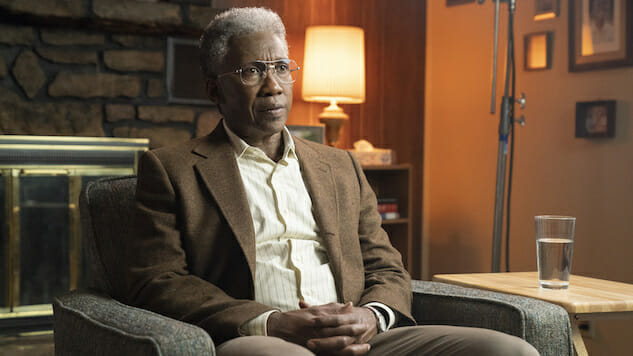True Detective and the Crisis of “True Crime”
Photo: Warrick Page/HBO
The narrative function is losing its functors, its great hero, its great dangers, its great voyages, its great goal. —Jean-François Lyotard, The Postmodern Condition
In this century, and moment, of mania,
Tell me a story. —Robert Penn Warren, “Tell Me a Story” / True Detective Season Three
“Remember”: It’s repeated so often in True Detective’s new season it threatens to lose sense, an imperative that doubles as an incantation. In 1980, following the disappearance of two children in the environs of Fayetteville, Ark., Det. Wayne Hays (the extraordinary Mahershala Ali) urges it of potential witnesses; in 2015, as he sits for an interview with the docuseries True Criminal, he does so of himself. In between, as his wife, Amelia (Carmen Ejogo), prepares to publish her “classic of literary nonfiction” on the case, an Ozark In Cold Blood, Hays finds himself in a deposition, assuring his interlocutor that he couldn’t possibly forget. “What you don’t remember,” the man counters, “you don’t know you don’t remember.” Such circular logic, and language, comes to define both Hays’ reflections on the case and, in Season Three, the series’ reflections on itself: True Detective eats its own tail.
As numerous critics have noted already, including Paste’s Amy Glynn, True Detective’s return to an impoverished, semi-modern South (now foothills, not bayous) and a multiple-timeline structure suggests a desire to recapture the success of its first season and repair the damage of its second—to which series creator Nic Pizzolatto applies the additional meta-shellac of specific referents (strange talismans, posed corpses, disfigured faces, grim crimes) and broader framing devices (True Criminal, Life and Death and the Harvest Moon, television news, Hays’ audiotaped aides-mémoires). The change, or change back, might be best understood, though, through the series’ corresponding shift in literary influences, from H.P. Lovecraft’s cosmic horror to Robert Penn Warren’s epistemological ballads. The latter’s “main obsession is knowledge,” and now True Detective’s is, too.
The question is, to what end? If the season’s self-reflexive streak is its most compelling feature, it is also, perhaps inevitably, its fatal flaw: The distancing effect True Detective uses to scaffold its rumination on the nature of memory and the construction of stories neuters both the mystery—which draws its scant suspense from the chronological chaos—and its emotional impact—which, for all of Ali’s mesmerizing efforts, is as thin as the foliage in an Arkansas winter. Taciturn, tormented detective; his jocular partner and thwarted wife; the devastated parents and their shattered community: Neither the specifics of the case, nor the forlorn realism with which it’s filmed, suggest that True Detective has much of note to add to the “missing persons” trope. The series is so eager to unpack the Truth it neglects the crime.
-

-

-

-

-

-

-

-

-

-

-

-

-

-

-

-

-

-

-

-

-

-

-

-

-

-

-

-

-

-

-

-

-

-

-

-

-

-

-

-








































